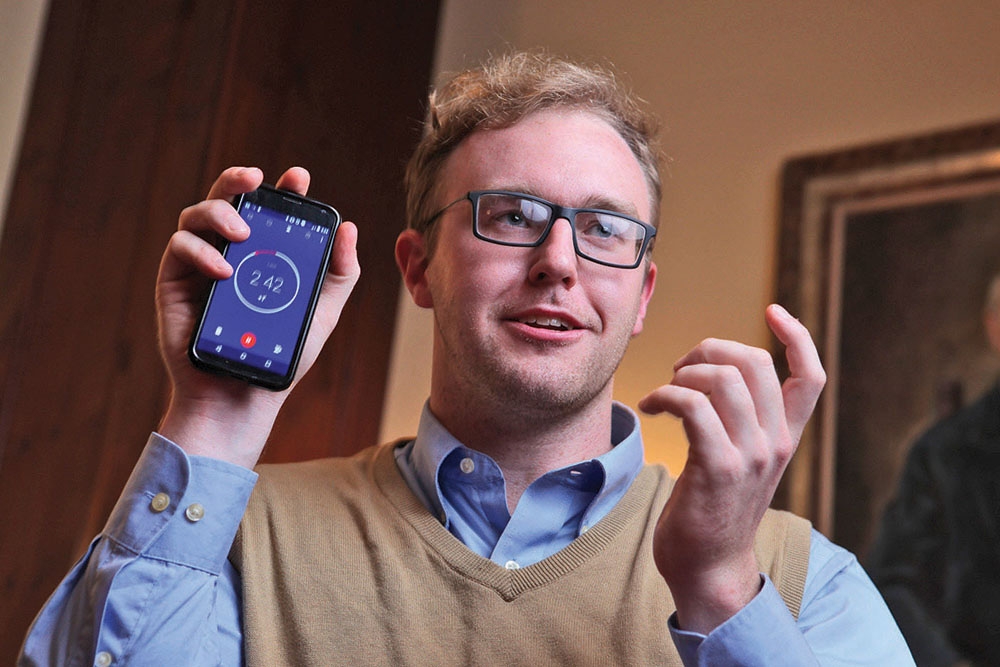Doctoral students sum up their theses — in three minutes or less
There were about 180 people in Uris Auditorium that afternoon in mid-November, and nearly all of them were research scientists. So when Robert Frawley — a doctoral candidate in physiology, biophysics and systems biology — opened his super-short speech about his spinal research with an inside joke, he knew he was preaching to the choir. "I said, 'Anyone can get lower back pain and degenerative disk disease. It comes from heavy lifting, having bad posture...'" — he wound up to the punch line — "'...and loading 96 well plates in the lab for six years!'"
Frawley got a laugh from his fellow bench scientists — the plates are standard lab equipment used to store and transfer samples — but ultimately, he took home the title for explaining his research in terms that any educated layperson could understand. The sixth-year grad student was the first-place finisher in Weill Cornell Medicine's inaugural Three-Minute Thesis competition, which challenges aspiring PhDs to summarize their research quickly, succinctly and engagingly. "In talking about your work, you need to be able to grab people's attention, especially if you're talking to non-specialists," says event organizer Dr. David Christini, the Weill Cornell Graduate School of Medical Science's associate dean for programmatic development and a professor of biomedical engineering in medicine. "You might have the opportunity for a longer conversation, but you hook them — or not — relatively early. So it's really valuable to be able to put your work into its important context and quickly express how exciting it is."
Founded at Australia's University of Queensland in 2008, Three-Minute Thesis — 3MT for short — has become a global phenomenon, with competitions at some 200 universities worldwide. The rules are simple. Entrants — who must be doctoral candidates who have joined their thesis lab — get 180 seconds to describe their research. They can use a single slide; no animations, props, video or music is allowed. "3MT is not an exercise in trivializing or 'dumbing-down' research," noted the announcement for Weill Cornell Medicine's competition, which was also open to the Gerstner Sloan Kettering Graduate School. "It forces students to consolidate and crystallize their ideas and research discoveries."
Weill Cornell Medicine's first-ever 3MT drew a respectable 16 entrants; after an initial round, 10 made it to the finals which were judged by a panel of faculty, staff and students from Weill Cornell Medicine and Gerstner. Frawley garnered top honors for describing his work, which involves developing a therapy to augment spinal fusion surgery for lower back pain. Second place went to another Weill Cornell Medicine student, Srivarsha Rajshekar, who gave a disquisition entitled "Heterochromatin: Loose it and Lose it!"; Gerstner's Marta Kovatcheva took third, for her talk on the molecular mechanisms of cancer drugs that inhibit the protein CDK4, which promotes cell growth. "Scientists communicate with each other fairly well, through our technical journals," Frawley observes. "But for our funding sources and for the public, we really do have to communicate better, and contests like this highlight the ability to be able to share our ideas on a slightly simpler level. It's essential so that science doesn't stay in its ivory tower, but can really be accessible, so more people understand what we're doing in the lab."
For the 3MT winners, the contest offered more than bragging rights. Not only did each of the three top finishers earn a $500 grant, but both Frawley and Rajshekar took home an additional $500 when they tied for the audience-choice award. "At the end, I made an awful pun — which everyone expected of me," Frawley admits with a rueful chuckle. "I'm known for my puns, unfortunately." His orthopedic groaner? "I said, 'The technique isn't perfect yet,'" he recalls, "'but we're boning up on our biochemistry.'" — Beth Saulnier
This story first appeared in Weill Cornell Medicine, Vol. 15, No.1.

